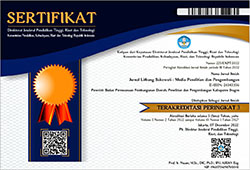Model Pemberdayaan Masyarakat Pedesaan Melalui Budidaya Jamur Tiram di Kabupaten Sumedang
DOI:
https://doi.org/10.32630/sukowati.v9i1.1487Kata Kunci:
budidaya jamur, model pemberdayaan, pembangunan perdesaanAbstrak
Perkembangan wilayah sangat dipengaruhi oleh perubahan iklim, pertumbuhan penduduk, urbanisasi dan industrialisasi yang mempengaruhi kondisi food security terutama dimensi produksi dan alih fungsi lahan pertanian di perdesaan. Budidaya jamur muncul sebagai alternatif pertanian, pengembangan budidaya jamur di Kabupaten Sumedang mengalami peningkatan produktivitas dari 3.449 ke 4.972/m2. Penelitian ini bertujuan mendeskripsikan peluang usaha budidaya jamur sebagai model pemberdayaan masyarakat perdesaan di kabupaten Sumedang. Metode penelitian yang digunakan adalah metode campuran dengan teknik pengumpulan data melalui observasi dan wawancara. Teknik analisis menggunakan rumus perhitungan penerimaan, keuntungan dan Bussines Model Canva. Hasil penelitian menunjukkan bahwa pendapatan produksi mandiri menghasilkan Rp. 4.886.500 dibandingkan sistem membeli log sebesar Rp. 3.300.000 dengan selisih sebesar Rp. 1.586.500 / 1.000 log sehingga memproduksi log mandiri lebih menguntungkan daripada membeli log siap panen. 2) Pelatihan budidaya jamur memberikan manfaat yang signifikan terhadap kegiatan budidaya ditunjukkan oleh peningkatan kompetensi budidaya, kualitas produksi, dan pendapatan. 3) Model pemberdayaan masyarakat menawarkan solusi mengentas kemiskinan, pengangguran dan peningkatan pendapatan melalui sistem budidaya jamur yang terintegrasi dengan jejaring aktor lokal dan daerah. Kesimpulan : Budidaya jamur menjadi solusi alternatif dalam mengatasi permasalahan ketenagakerjaan dan perekonomian masyarakat perdesaan didukung oleh jejaring antar stakeholder melalui model pemberdayaan masyarakat perdesaan yang dapat menarik minat masyarakat dan pengembangan Badan Usaha Milik Desa (BUMdes) dalam kegiatan berwirausaha.
Unduhan
Diterbitkan
Cara Mengutip
Terbitan
Bagian
Lisensi
Hak Cipta (c) 2025 Rosa Saefi Yusuf Albanah

Artikel ini berlisensi Creative Commons Attribution 4.0 International License.


















